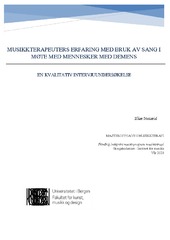| dc.contributor.author | Nonseid, Elise | |
| dc.date.accessioned | 2020-03-11T03:42:35Z | |
| dc.date.available | 2020-03-11T03:42:35Z | |
| dc.date.issued | 2020-03-11 | |
| dc.date.submitted | 2020-03-10T23:00:06Z | |
| dc.identifier.uri | https://hdl.handle.net/1956/21463 | |
| dc.description.abstract | I denne masteroppgaven har jeg undersøkt musikkterapeuter sin erfaring med å bruke sang i møte med mennesker med demens. Jeg intervjuet seks musikkterapeuter og spurte dem om hvilke erfaringer, tanker og opplevelser de hadde med å bruke sang med mennesker med demens. Den økende andelen mennesker med demens og behovet for et fornyet repertoar i eldreomsorgen i møte med mennesker med demens var bakgrunnen for valg av tema. Jeg ønsket å se hvordan musikkterapi, og nærmere sang, kan være et positivt tilskudd i hverdagen for mennesker med demens boende på sykehjem. Som metode for å analysere funnene og resultatene fra intervjuene brukte jeg ”tematisk analyse”. Jeg hentet fram relevante utdrag fra intervjuene, formet koder ut ifra dem og organiserte disse i underordnede temaer og overordnet tema. Likheter og forskjeller mellom utdragene fra informantene ble så analysert. I diskusjonen sammenlignet jeg funnene og resultatene fra intervjuene med forskning, studier og case fra teori og litteraturgjennomgangen. Jeg presenterte de mest fremtredende resultatene og diskuterte positive og negative sider ved å bruke sang med mennesker med demens. Resultatene viser at det er mange positive sider ved å bruke sang i musikkterapi med mennesker med demens. Både studier og forskning fra litteraturgjennomgangen og intervjuene viser mye de samme resultatene. Det så særlig ut som sang hadde positiv innvirkning på agitert atferd hos mennesker med demens. Sangen hjalp til å skape ro og få dem til å fokusere kun på sangen. Virkningen av musikkterapi på agitasjon hos mennesker med demens er omdiskutert og vanskelig å gjøre rede for og derfor et viktig funn som blir diskutert i oppgaven. Funnene fra min studie viser at sang kan være positivt for felleskap, mestring, mening, bedre kontakt med seg selv og bedre atferd. For mennesker med demens har sang også positiv virkning på hukommelse, språkferdigheter, depresjon og angst. | en_US |
| dc.description.abstract | The topic for this master thesis was to explore the following question: How do Music Therapists perceive the use of song meeting people with dementia?. I chose this topic because dementia is an important field where many people are affected by this disease. Alternative treatments are necessary to approach the needs for people with dementia. When music therapy has shown to be positive for people with dementia, I thought music therapy and dementia was a relevant topic for my master thesis. I interviewed six music therapists with experience from working with people with dementia and that were familiar with using song as a method in music therapy. My interest was to get a better view on how music therapists thought, experienced and perceived using song as a method meeting people with dementia. I wanted to know if song could be positive for people with dementia and if yes, why and how it was positive. The method I used for analyzing the data from the interviews was a ”thematic analysis”. I gathered relevant extracts from the interviews and formed codes that I organized in secondary themes and main themes. My findings were analyzed and I found differences and similarities between the interviews. In the discussion I compared previous studies and research, from the theory and literature section, with the results from the interviews in the analysis. I presented the most important findings and discussed them in relation to the issue for the thesis. In the results I looked for positive and negative sides on using song with people with dementia. The music terapists described several postive aspects related to the use of song in music therapy with people with dementia. Especially it seems like song can be positive on agitation, which all the music therapists I interviewed experienced. Furthermore, song seems to be positive for people with dementia`s feeling of connection, fellowship, meaning, behavior empowerment, mastery and quality of life. Song can also be useful for memory, speech, orientation, completion of tasks, depression and anxiety for people with dementia. Studies from the theory and literature section showed similar results as the results from the interviews. | en_US |
| dc.language.iso | nob | |
| dc.publisher | The University of Bergen | |
| dc.rights | Copyright the Author. All rights reserved | |
| dc.subject | erfarer | |
| dc.subject | Nøkkelord: Musikkterapi | |
| dc.subject | perceive | |
| dc.subject | people with dementia | |
| dc.subject | singing | |
| dc.subject | mennesker med demens Keywords: Music therapy | |
| dc.subject | sang | |
| dc.title | MUSIKKTERAPEUTERS ERFARING MED BRUK AV SANG I MØTE MED MENNESKER MED DEMENS | |
| dc.type | Master thesis | |
| dc.date.updated | 2020-03-10T23:00:06Z | |
| dc.rights.holder | Copyright the Author. All rights reserved | |
| dc.description.degree | Masteroppgave i musikkterapi | |
| dc.description.localcode | MUTP350 | |
| dc.description.localcode | MAHF-MUTP | |
| dc.description.localcode | MAHF-INMUT | |
| dc.subject.nus | 715136 | |
| fs.subjectcode | MUTP350 | |
| fs.unitcode | 18-30-0 | |
